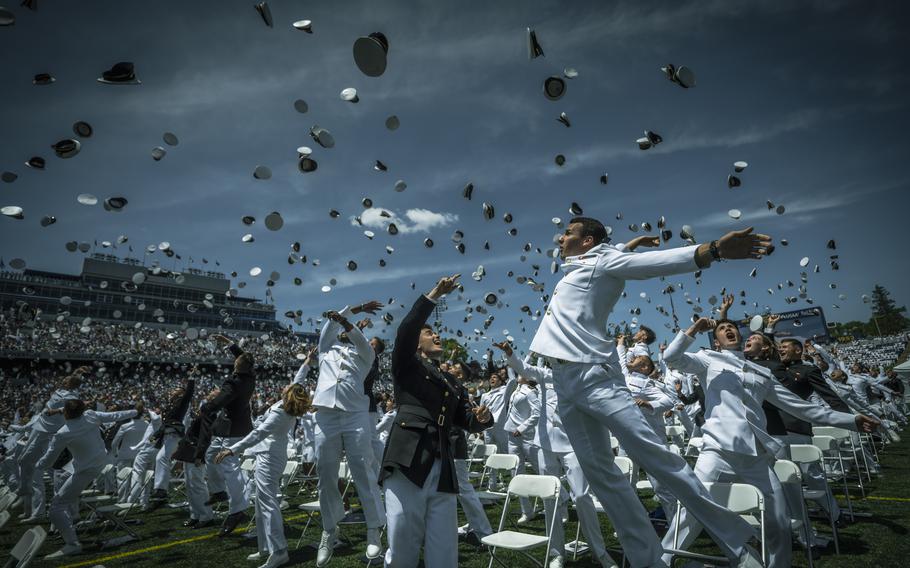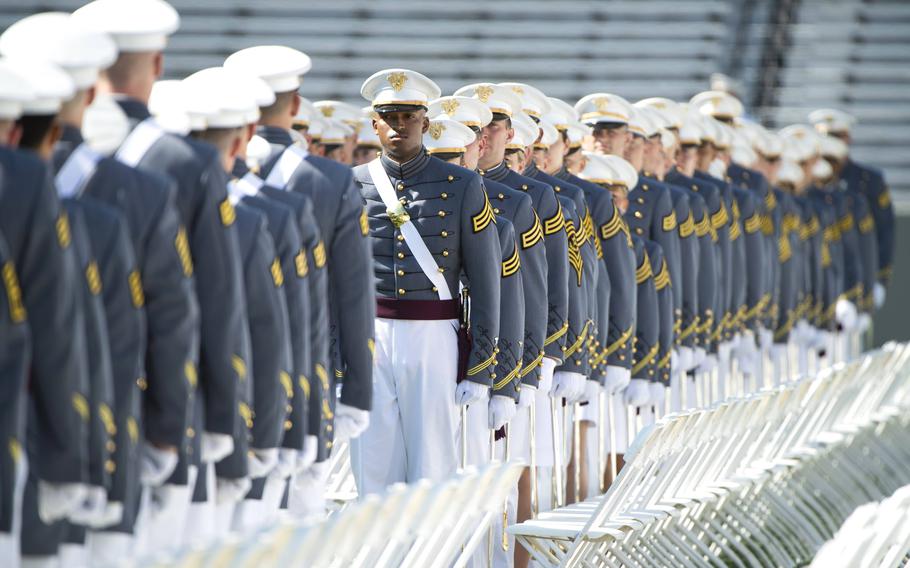
Newly comissioned U.S. Marine Corps second lieutenants and U.S. Navy ensigns toss their covers in celebration at the conclusion of the U.S. Naval Academy’s Class of 2023 graduation ceremony at Navy-Marine Corps Stadium, Annapolis, Md., May 26, 2023. Cadets and midshipmen at the Pentagon’s three military academies can now officially stay enrolled and remain on track for a military career if they give birth to a child under a new policy published this month. (Chad J. McNeeley/Defense Department)
WASHINGTON — Cadets and midshipmen at the Pentagon’s three military academies can now officially stay enrolled and remain on track for a military career if they give birth to a child under a new policy published this month.
For decades, cadets at the U.S. Military Academy at West Point and Air Force Academy in Colorado and midshipmen at the Naval Academy in Maryland were not allowed to have children while enrolled. Many who did were forced to leave and some had to reimburse the government for tens of thousands of dollars in past tuition.
Two years ago, bipartisan efforts in Congress led to a policy change to let members at the academies have a child without fear of being sidetracked or losing their spot in school. The change was formally made on Nov. 1.
“A cadet or midshipmen who becomes pregnant may be granted a leave of absence for good cause,” the updated policy states. “In most cases, a one-year leave of absence will be sufficient. In unique circumstances, the [service academies] can grant a leave of absence not to exceed two years.”
Under the new policy, however, cadets and midshipmen still cannot enroll at the three service academies if they’re pregnant or already have children. The change only applies to service members who become parents during the time they’re enrolled.

U.S. Military Academy cadets line up at the graduation and commissioning ceremony for the Class of 2023 at Michie Stadium in West Point, N.Y., on May 27, 2023. (John Pellino/U.S. Military Academy)
The policy comes with several requirements. For example, new parents at the academies each must submit a guardianship plan to the military that outlines who the child will live with until graduation. Also, the newborn children are not allowed to live with their parents at the academies. Pregnant cadets and midshipmen will also receive a temporary break on certain requirements at the academies.
Under the new policy, physical fitness requirements are temporarily waived throughout pregnancy until the cadet or midshipman is medically cleared.
“I lived through being a cadet and having a family at the same time and I would never, ever recommend someone do it,” Air Force Reserve Maj. Melissa Hemphill, who had a child with her cadet boyfriend while they were at the academy, told Stars and Stripes earlier this year. “But at the same time, we can’t wish away unexpected pregnancy because it’s going to happen. It has been happening and it does happen. … It was really devastating to families and also it was affecting a lot more people than we thought.”
Sens. Ted Cruz, R-Texas, and Kirsten Gillibrand, D-N.Y., were behind the bipartisan effort in Congress to change the policy. Cruz felt the old policy encouraged abortions, and Gillibrand said it was outdated and unfair to women.
“Parents shouldn’t be forced to fully relinquish their parental rights to finish their education at our service academies,” Gillibrand said.
“[This] is a commonsense step to ensure the brave young women of our armed forces have the right level of support to continue their academy training and go on to fulfill their future service as commissioned officers while raising their family,” Cruz said. “This crucial legislation [ensures] cadets in military academies can retain legal guardianship of their children without unnecessary burdens.”
The new policy does not apply to cadets at the Coast Guard Academy in Connecticut or the Merchant Marine Academy in New York since neither is run by the Pentagon. The Coast Guard falls under the Department of Homeland Security and the Merchant Marine under the Department of Transportation.
Stars and Stripes reporter Rose Thayer contributed to this report.

As the U.S. Air Force Thunderbirds fly overhead, cadets celebrate at their graduation ceremony at the Air Force Academy in Colorado, May 25, 2022. (Chad J. McNeeley/Defense Department)